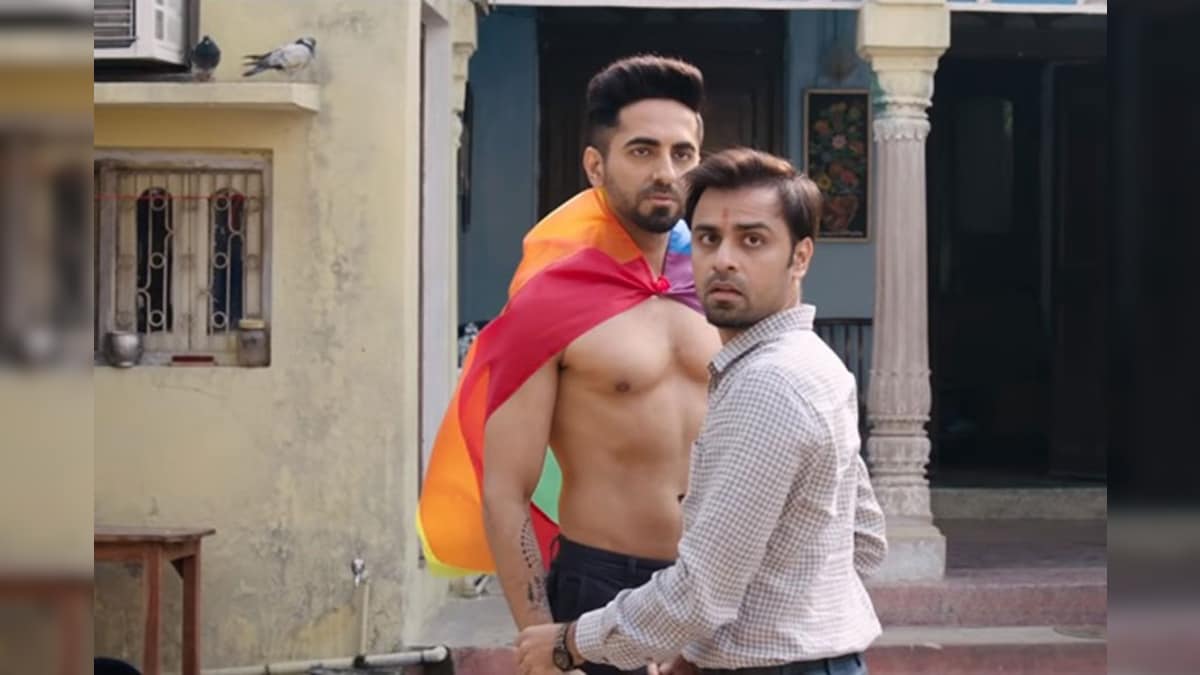
Shubh Mangal Zyada Saavdhan
Cast: Ayushmann Khurrana, Jitendra Kumar, Gajraj Rao, Neena Gupta
Director: Hitesh Kewalya
Smack in the middle of Shubh Mangal Zyada Saavdhan, Ayushmann Khurana’s character Kartik says to his boyfriend’s homophobic father that gay people have to fight every day, but there is no fight harder than the one with your family.
There is unmistakable dignity in the way that the same-sex relationship at the centre of this film has been treated. When we meet the flamboyantly filmi Kartik and his boyfriend Aman (Jitendra Kumar), they are already in love and living together in Delhi. It’s just that Aman hasn’t come out to his family back home in Allahabad. Considering the theme, the dialogues are sensitive and the repartee between the characters frequently crackling.
When Aman does open up about his love for Kartik to his scientist father (Gajraj Rao) and his straight-talking mother (Neena Gupta), he talks of dopamine, oxytocin, and of his hypothalamus. Aman explains his feelings in chemical terms, but it nicely captures the sheer splendour of love.
Admirably, writer-director Hitesh Kewalya doesn’t mine laughs from stereotyping gay characters in the way that mainstream Hindi films have done for as long as one can remember. Aside from an innocuous nose-ring that Ayushmann wears, there are no obvious markers of femininity. What’s especially refreshing is that the lovers or their relationship is never the source of comedy, it’s the extreme reactions by those around them to their relationship that is treated with humor. In that, Shubh Mangal Zyada Saavdhan is not so much about homosexuality as it is about homophobia.
But the humour, as it turns out, is hit and miss. 2017’s Shubh Mangal Saavdhaan cleverly and amusingly beefed up the role of the extended family in what was essentially the story of a soon-to-be-married couple and the ‘problem’ they’re confronted with. This film too puts the family centrestage, but that overcomplicates the story. There’s a trying-too-hard quest for laughs that starts wearing thin. Aman’s folks argue incessantly and blame each other while trying to deal with the ‘situation’, until the story feels stretched and silly. The bullying relationship between Gajraj’s character Shankar Tripathi and his brother Chaman (Manu Rishi) is funny initially, but it works strictly as a side act and loses steam when it becomes the film’s main source of drama and laughs.
A portion in which Tripathi stages a religious ‘rebirth’ ceremony to ‘normalise’ his son doesn’t land, and a subplot involving his invention of black cauliflower is a contrived metaphor.
The immensely likeable Gajraj Rao, trapped in a not-so-likeable character, is both one of the film’s strengths and weaknesses. In a very funny scene, Tripathi has a violent physical reaction when he spots his son in a clinch with his lover while the family is heading by train for a wedding. Tripathi is a real hoot when he’s nervous and vulnerable – like in his impromptu dance-off with Kartik – but there is little joy in the bits where he’s the standard-issue villain-dad.
Even the pairing of Gajraj Rao and Neena Gupta as Aman’s parents, inspired no doubt by their wonderful chemistry in Badhaai Ho, is largely underutilised.
There’s a naughty joke snuck in there about how she relieves her husband’s anxiety, but for the most part the bickering gets tiresome. Aman’s chacha and his hysterical chachi, played by Manu Rishi and Sunita Rajwar, are funnier. In one scene, to underplay the PDA that Aman and Kartik indulge in at their daughter’s wedding, the couple comes up with an explanation so far-fetched, it’s hard to hold back the laughs.
It’s interesting that Kewalya uses the classic Dilwale Dulhania Le Jayenge blueprint to stage this story of parental opposition in the face of true love and a couple’s longing for acceptance from the stubborn family. It’s a smart approach to push out the message that gay relationships are the same as straight ones; the conflicts are all too familiar. Shubh Mangal Zyada Saavdhan also ticks the boxes of an ‘Ayushman Khurrana social message movie’. The gay characters are self-respecting men dead against the idea of marrying a woman out of convenience. Parental denial is also addressed head-on, and frowned upon using clap-trap dialogues.
There are many zingers in the film, delivered with flair and timing by Kewalya’s cast. As Kartik, who wears his heart on his sleeve, ready to go to war for love, Ayushmann Khurrana gets the lion’s share of winning one-liners. He plays Kartik as confident and comfortable in his skin, but also a tad hyper. The film is respectful but never shy of depicting affection between its protagonists, and that’s especially worthy of praise in a famously squeamish, homophobic cinema. So many actors – Sanjay Suri in My Brother Nikhil, Manoj Bajpai in Aligarh, Fawad Khan in Kapoor & Sons, Shabana Azmi in Fire, Kalki Koechlin in Margarita with a Straw, and others – paved the way so Ayushmann and Shubh Mangal Zyada Saavdhan could take the baton and run. The film’s ‘normal’ treatment of the gay character, and Ayushmann’s assertive performance is a victory in itself.
But while all the slow-motion entries and exits go to Ayushmann, the film’s secret weapon is Jitendra Kumar whose Everyman portrayal of Aman is one of the film’s big strengths. The actor, who has appeared in many web series including Kota Factory, has a warm, grounded presence that makes the character’s vulnerability all too authentic. Jitendra and Ayushmann have real chemistry; their little moments together bring depth to the film.
Shubh Mangal Zyada Saavdhan isn’t consistent. The script spends too much time focused on the infighting within Aman’s family instead of staying with the leads. Despite that there is enough to enjoy and appreciate here. It takes a difficult subject and executes it with some flair. For that, I’m going with three out of five.
Rating: 3/5
Follow @News18Movies for more













